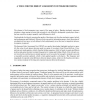Free Online Productivity Tools
i2Speak
i2Symbol
i2OCR
iTex2Img
iWeb2Print
iWeb2Shot
i2Type
iPdf2Split
iPdf2Merge
i2Bopomofo
i2Arabic
i2Style
i2Image
i2PDF
iLatex2Rtf
Sci2ools
ICGA
2006
2006
A Tool for the Direct Assessment of Poker Decisions
The element of luck permeates every aspect of the game of poker. Random stochastic outcomes introduce a large amount of noise that can make it very difficult to distinguish a good player from a bad one, much less trying to quantify small differences in skill. Good methods for directly assessing the quality of decisions exist for other stochastic games, including backgammon and blackjack. However, those are perfect information games, where the notion of an objectively best move is well-defined, which unfortunately is not the case for imperfect information games, in general. The Ignorant Value Assessment Tool, DIVAT, uses perfect knowledge (hindsight) analysis to quantify the value of each player decision made in a game of two-player Limit Texas Hold'em. Comparisons are made against a realistic baseline betting sequence, which is based on quasi-equilibrium policies and game-theoretic invariant frequencies for raising and folding. Much of the relevant context involved in each decisi...
| Added | 12 Dec 2010 |
| Updated | 12 Dec 2010 |
| Type | Journal |
| Year | 2006 |
| Where | ICGA |
| Authors | Darse Billings, Morgan Kan |
Comments (0)

